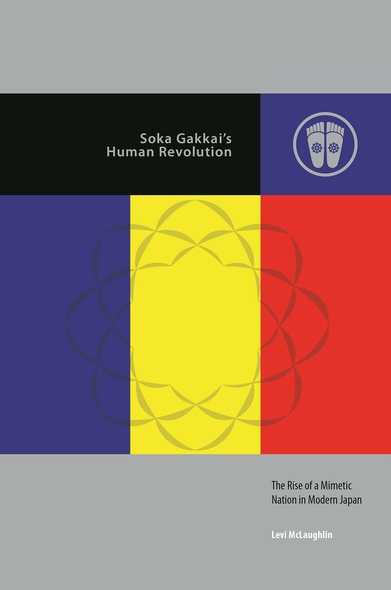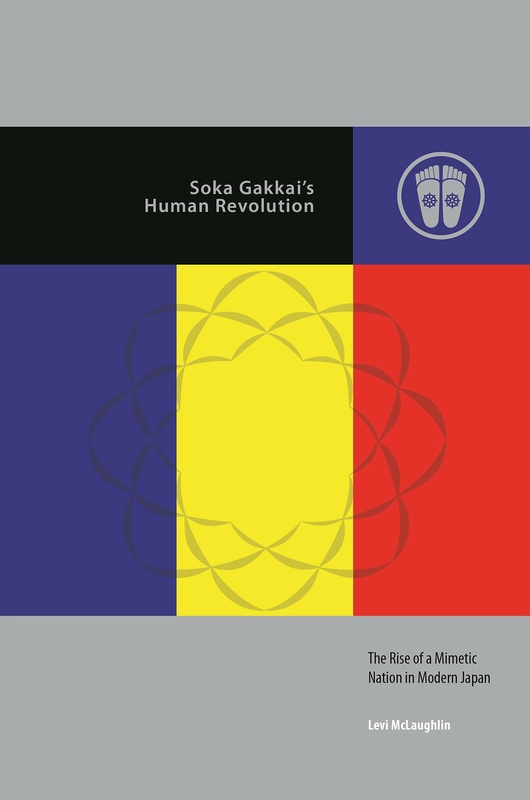
Soka Gakkai’s Human Revolution
The Rise of a Mimetic Nation in Modern Japan
Soka Gakkai is Japan’s largest and most influential new religious organization: It claims more than 8 million Japanese households and close to 2 million members in 192 countries and territories. The religion is best known for its affiliated political party, Komeito (the Clean Government Party), which comprises part of the ruling coalition in Japan’s National Diet, and it exerts considerable influence in education, media, finance, and other key areas.
Levi McLaughlin’s comprehensive account of Soka Gakkai draws on nearly two decades of archival research and non-member fieldwork to account for its institutional development beyond Buddhism and suggest how we should understand the activities and dispositions of its adherents. McLaughlin explores the group’s Nichiren Buddhist origins and turns to insights from religion, political science, anthropology, and cultural studies to characterize Soka Gakkai as mimetic of the nation-state. Ethnographic vignettes combine with historical evidence to demonstrate ways Soka Gakkai’s twin Buddhist and modern humanist legacies inform the organization’s mimesis of the modern Japan in which the group took shape. To make this argument, McLaughlin analyzes Gakkai sources heretofore untreated in English-language scholarship; provides a close reading of the serial novel The Human Revolution, which serves the Gakkai as both history and de facto scripture; identifies ways episodes from members’ lives form new chapters in its growing canon; and contributes to discussions of religion and gender as he chronicles the lives of members who simultaneously reaffirm generational transmission of Gakkai devotion as they pose challenges for the organization’s future.
Readers looking for analyses of the nation-state and strategies for understanding New Religions and modern Buddhism will find Soka Gakkai’s Human Revolution to be an especially thought-provoking study that offers widely applicable theoretical models.
McLaughlin’s book offers a supremely readable and enlightening account of the social and institutional dynamics within Soka Gakkai in present-day Japan. . . . [His] book catches Soka Gakkai at a critical juncture, and it will no doubt remain a classical witness account of this historical moment.
The book’s detailed examination of the Soka Gakkai’s novels, The Human Revolution and The New Human Revolution, put the book in dialogue with contemporary trends in Religious Studies, such as attention to text, narrative, scripture, and processes of canon formation.
McLaughlin’s work is well written and meticulously researched. It is a landmark study that deserves to be the key authoritative source on the Soka Gakkai in English. McLaughlin presents an up-close view of Soka Gakkai based on many years of painstaking study. His careful use of primary sources and his intimate interactions with members allow his readers to enter into the world of Gakkai followers. . . . Anyone who is interested in the future of Soka Gakkai should begin by reading McLaughlin’s excellent and thought-provoking account of its present.
Based on years of fieldwork study, this engaging and acutely perceptive study introduces the idea of ‘mimetic nation’ to analyze Soka Gakkai’s internal structure, its motivational system, and its aspirations. McLaughlin’s extensive ties among the membership bring to life the spectrum of beliefs, practices, and attitudes to the organization, so that the reader can understand how and why Soka Gakkai has become a major force in Japanese society and politics. Highly recommended!
McLaughlin draws on two decades of intimate friendships with Soka Gakkai members to present a penetrating scholarly picture of the largest of Japan’s modern religions. McLaughlin never became a member, but he read the Nichiren texts in the original, passed the introductory doctrinal exam, played violin in the orchestra, and became friends with many of the 200 members he interviewed throughout Japan. He provides a fresh framework for viewing the Soka Gakkai as an organization that imitates the nation-state.
This book is well-sourced, well-organized, and well-written. McLaughlin has been immersed in the Soka Gakkai for many years, and his data base is rich not only documentarily, but also ethnographically, with dozens and dozens of illuminating statements by and personal experiences with members of the Gakkai. His thesis, that understanding the Gakkai requires recognition of its recapitulation of many of the institutional and symbolic features of the modern Japanese nation-state, is clearly and persuasively argued. It is the most well-rounded and comprehensive analysis of the growth and continuing strength of—and potential future challenges facing—the Soka Gakkai available today.
This work by McLaughlin, as a whole, is an excellent, comprehensive and thought-provoking study on Sōka Gakkai in Japan. This is partly because it is based on quite remarkable and meticulous research . . . and because it provides a very stimulating analysis of its movements through his distinctive perspective and concepts such as the mimetic nation metaphor and the participating of members into the canon formation. . . . McLaughlin’s work is surely the best among studies and writings about Sōka Gakkai in Japan that I have read in recent years, in English as well as in Japanese.
Levi McLaughlin’s Soka Gakkai’s Human Revolution: The Rise of a Mimetic Nation in Modern Japan is a brilliant introduction to Soka Gakkai as an organization and as a social movement. . . . [This book] should be recommended as the most essential reading to all students and scholars who are about to start any serious study of Soka Gakkai.
Balanced and in-depth ethnographic accounts of Soka Gakkai are very limited, despite the movement’s influence on the Japanese religious landscape. This excellent work, based on almost twenty years’ engagement with adherents and the local community, fills this gap in the scholarship and will serve as an indispensable reference for further ethnographic study on religion in secularized societies.
Levi McLaughlin is associate professor at the Department of Philosophy and Religious Studies, North Carolina State University.





